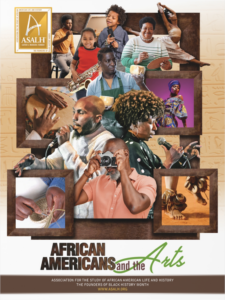
The 2024 Association for the Study of African American Life and History (ASALH) Poster Committee invites submissions for posters that address the conference theme, “African Americans and the Arts”. Proposals that address the theme are preferred, however, any timely subject of interest to African American history will be considered. We encourage proposals from scholars working across a variety of temporal, geographical, thematic, and topical areas in Black history, life and culture.
Poster sessions are a means to communicate and exchange ideas, programs, research, and projects to fellow ASALH meeting attendees. This is a forum for exchanging innovative ideas, and for useful feedback and discussion. Viewers have an opportunity to become acquainted with new work quickly and easily and have more time to study the information and discuss it with presenters. Posters are often used to showcase a completed project, or to communicate ideas about research in progress.
Posters may be on any of the following:
- a description of an innovative program
- an examination of a practical, problem-solving endeavor
- an explanation of a research investigation
- novel projects or case studies
- branch histories
- community and/individual profiles
Proposals will be accepted for in-person and virtual presentations.
The committee seeks posters that probe the traditional fields of economics, accounting, politics, medicine, psychology, intellectual, and cultural history; the established fields of urban, race, ethnic, labor, and women’s/gender history as well as southern and western history; along with the rapidly expanding fields of sexuality, LGBTQIA, and queer history; environmental and public history; African American intellectual history; literature; and the social sciences. We look forward to proposals that center Black/African Diasporic resistance from multiple regions, embrace de-coloniality, and engage embodiment.
Submissions are welcome from all ASALH members, especially from ASALH Branches, high school, undergraduate and graduate students, and individuals who are recent graduates. If your proposal is accepted, you will have to join the Association and register for the conference.
Conference Theme
In 2024, we examine the varied history and life of African American arts and artisans. African American art is infused with African diasporic, Caribbean, and the Black American lived experiences. In the fields of visual and performing arts, literature, fashion, folklore, language, film, music, architecture, culinary, and other forms of cultural expression the African American influence has been paramount. African American artists have used art to preserve history and community memory as well as for empowerment. Artistic and cultural movements, such as the New Negro, Black Arts, Black Renaissance, hip-hop, and Afrofuturism, have been led by people of African descent and set the standard for popular trends around the world. For centuries Western intellectuals denied or minimized the contributions of people of African descent to the arts as well as history, even as their artistry in many genres was mimicked and/or stolen. However, we can still see the unbroken chain of Black art production from antiquity to the present, from Egypt across Africa, from Europe to the New World.
Submission
All proposals should be submitted via the All Academic system. You will need to provide an abstract (300 words or less), a title of your presentation, your name, email, and affiliation.
The submission deadlines for proposals are as follows: Early Bird Submissions will be accepted via All Academic until March 18, 2024 at 11:59 p.m. (EST). Conditional acceptance responses to Early Bird submissions will be sent out by April 21, 2024 at 11:59 p.m. (EST). After this date, the committee will accept all submissions until the deadline of May 17, 2024 at 11:59 p.m. (EST). Regular conditional acceptances submissions will be responded to by June 9, 2024 at 11:59 p.m. (EST). You will not be considered official until all session participants have joined the Association and registered for the conference.
Woodson Ambassadors Program
The Association for the Study of African American Life and History proudly announces its Woodson Ambassador Program, which is an early professional training for History, Public History, and Museum Studies Scholars.
Students who attend ASALH’s Annual Meeting and Conference get to:
- Attend and participate in workshops and sessions geared toward rising professionals
- Dissertation Workshops
- Poster Sessions
- Gain experience working in a professional society as a member of the on-site program committee and/or the local arrangement committees.
- Receive a certificate verifying that they were a Woodson Ambassador
Who can participate
- Undergraduate and graduate students who are interested in professional development.
- Must pay conference fees, including membership, registration fees, room and board.
- Willing to volunteer for a minimum 4 hours during the conference

